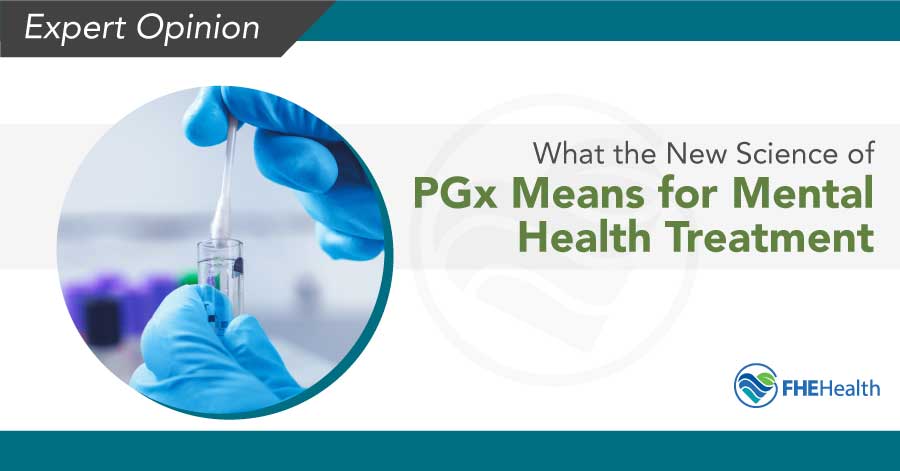
This article has been reviewed for accuracy by our peer review team which includes clinicians and medical professionals. Learn more about our peer review process.
When used by healthcare providers to prescribe certain medications, the new science of non-invasive pharmacogenetic testing, or “PGx,” can show genetic markers that reveal how these medications may interact with patients. PGx uses a simple cheek swab to analyze gene variants for genes that may predict responses to medications like:
- Certain antidepressants
- Anticonvulsants
- Anticoagulants
- Medication-assisted treatments for addiction
- Benzodiazepines
- ADHD therapy
- Antipsychotics
- Opioids
- Muscle relaxants
- NSAIDs
- Platelet inhibitors
Most of these medications for which PGx can test an individual’s genetic compatibility are “psychotropic” drugs, meaning those prescribed for mental health conditions. People with these disorders thus stand to benefit the most from PGx. And, they may also have questions about it. For instance, they may wonder about its degree of accuracy in predicting a good fit of medication—or even whether its use of “genetic testing” means it can help predict mental illness that is hereditary.
In a recent interview, FHE Health Medical Director and psychiatrist Dr. Albert Castellon, MD, helped to shed light on these questions. He also demystified some of the misconceptions about PGx and its potential for treating inherited mental disorders….
What Is PGx – A Closer Look
As “a cheek swab genetic test for psychotropic medications,” PGx “reveals how psychotropic medications metabolize and respond best for patients,” Dr. Castellon said. He explained that PGx “analyzes genetic variations in one’s DNA and how one’s body breaks down the medication,” and that “it can reveal which medications will work best for patients with psychiatric conditions such as depression, anxiety, or ADHD…”
How PGx Can Improve the Prescribing of Medications
In this sense, “genetic testing for psychotropic medications may improve prescribing habits,” by helping a primary care doctor or psychiatrist be more accurate when choosing “which medications may be most beneficial … Since psychiatric medicine can be trial and error at times, this allows the physician to better focus on certain medications that may work more efficiently.”
Before PGx, prescribing medication like an antidepressant involved a good deal more guesswork, followed by an extended waiting period. During the next four to six weeks, both patient and physician would then have to wait to see whether the antidepressant was working and whether its side effects were tolerable. If the medication turned out to be intolerable, the whole process of guessing and prescribing would have to begin again, only with a different medication.
PGx helps to streamline this prescribing process so that it is quicker, more efficient, and more accurate from the get-go. That savings in time and pain and suffering can be a big help to patients who may be majorly depressed and in need of symptom relief as soon as possible.
At the same time, though, PGx is limited in the predictions that it can make. It is only analyzing how the body metabolizes certain classes of medications, as opposed to pinpointing which specific medication will be best at restoring a patient’s brain health, for example. In other words, PGx can narrow down the field of prospective medications to prescribe but ultimately will not be able to tell a physician which medication will best relieve the patient’s mental health symptoms.
Can PGx Predict Inherited Disorders and Mental Illness That Is Genetic/Hereditary?
Insofar as PGx is “genetic testing,” it can sometimes be misconstrued as a predictor of inherited disorders and mental illness that is genetic or hereditary. Here, too, it is important to acknowledge the limitations of PGx. Human beings share 99.9 percent of the same DNA. Only .1 percent of DNA is what makes each person—their brain and body—different.
PGx can test only a very small slice of that .1 percent of DNA—namely, specific genetic enzymes that metabolize certain drugs. Sometimes the results of this testing may align with a family history of response to treatment (if there is a family history), but not always.
If you’re wondering, then, “Does depression run in my family?” PGx is not designed to answer that question. It also cannot tell you whether you will end up with a particular mental illness because of certain genes.
Keep in mind, too, that genetics are only one contributing factor to depression and other mental health conditions, anyway. Your lifestyle, environment, and experiences play a major role.
The Future of PGx Testing and Its Impact on Mental Health Treatment
“Currently, the typical setting used for genetic testing is an outpatient setting,” Dr. Castellon said. “Also, it is generally used in patients who have attempted multiple medications in the past with poor results.”
PGx tends not to be widely used in inpatient settings because it is more limited in what it can do for patients in these environments, according to Dr. Castellon. Also, an inpatient setting tends to facilitate closer and more efficient psychiatric supervision of how patients respond to prescribed medications.
“While in an inpatient setting, we have the ability to make changes to medications more rapidly to achieve the desired effect,” Dr. Castellon said. “We also have the ability to change medications more rapidly in order to achieve the desired effect.”
PGx’s limitations aside, Dr. Castellon remains hopeful that this type of genetic testing will become a more mainstream tool that can be used at the outset of outpatient treatment (during a first visit to the psychiatrist). He put it this way:
Hopefully in the future, when patients are initially seen by a psychiatrist, genetic testing can be performed to establish a more efficient treatment plan. As genetic testing becomes more mainstream, the psychiatric field will likely start using it more often to help us decide which medications to use first.
And, for the millions of Americans who may be suffering with anxiety, depression, or another mental health disorder, that is one more good reason to seek treatment.






